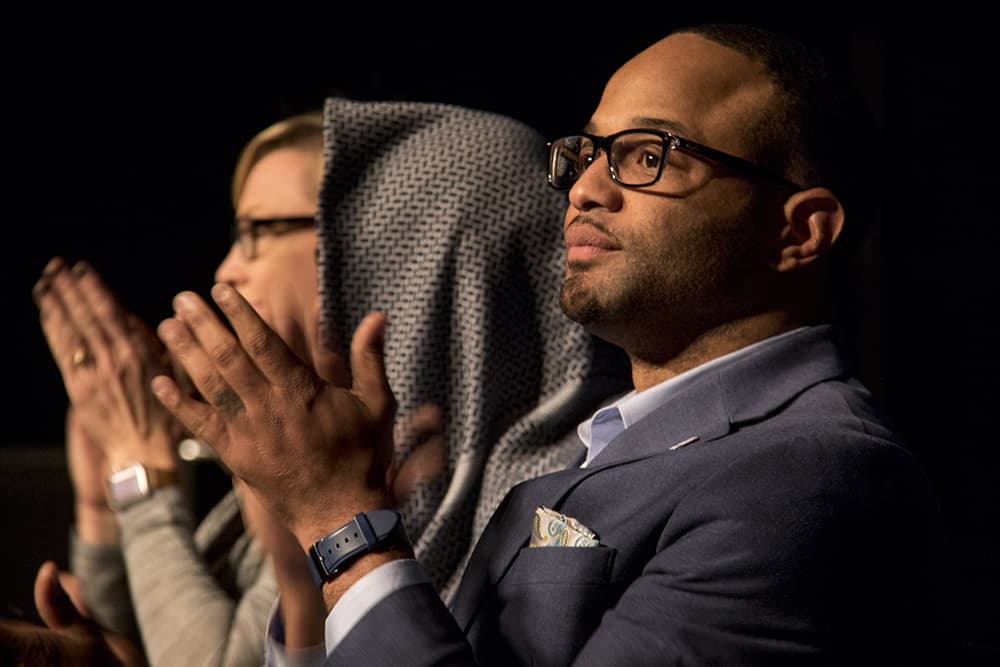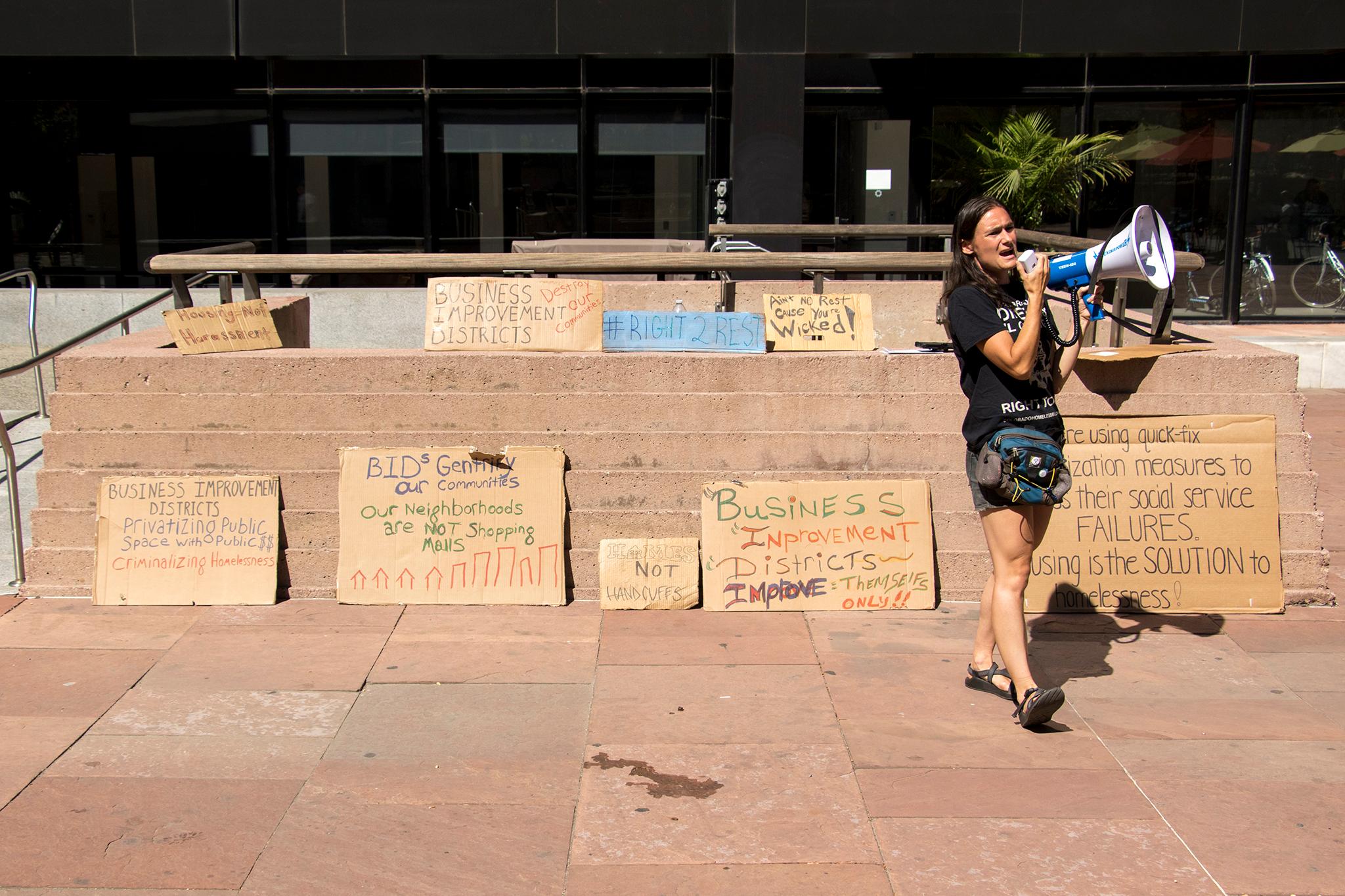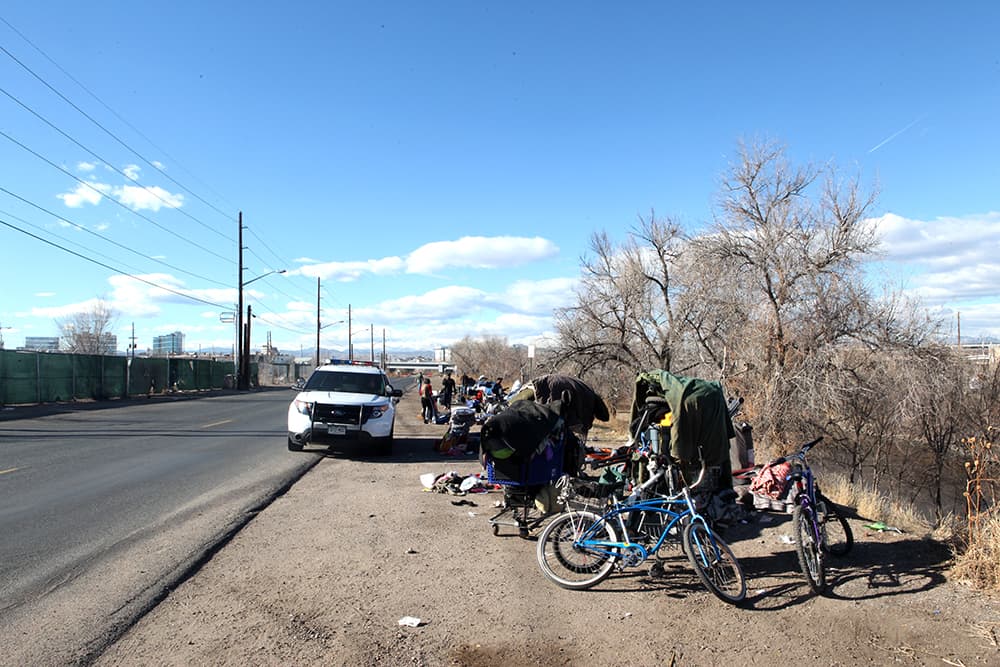Denver Homeless Out Loud organizer Benjamin Dunning got an urgent reminder Tuesday of why he and the organization he works for are pushing for a ballot measure effectively repealing the city’s urban camping ban.
It was a call from a man who told him he’s about to lose his living space.
“He didn’t give me the details about what’s going on, but he says ‘I’m going to be homeless soon,’” Dunning said. “So I was explaining to him: biggest issue is know where to camp, know where the police are sweeping. So the reason the ordinance is important is people need to sleep.”
Organizers are hoping to give voters a chance to decide whether to repeal the city’s controversial urban camping ban during the May 2019 municipal election. Advocates for people experiencing homelessness say the current ban prevents people from finding safe spaces to sleep and exposes them to police harassment. It’s been in place since 2012.
“This initiative actually protects the right to sleep and use blankets but also protects just the basic right to exist in public space,” Denver Homeless Out Loud’s Terese Howard said.
Howard said they’ve collected more than 9,000 signatures for the measure, called the "Right to Survive Initiative." They need at least 4,726 signatures from registered voters in the city for a spot on the ballot. They’re planning on dropping off the signed petitions to the Denver Elections Division next Monday, way ahead of the Jan. 7, 2019, deadline.
Howard said it’s the first time they’ve tried passing the ordinance through the city’s ballot initiative process. The group has tried presenting a similar, statewide bill for the past four years.
The initiative would ask voters to "adopt a measure that secures and enforces basic rights for all people" in Denver. It would give people the right to rest and shelter in a "non-obstructive" manner in public and outdoor spaces and allow people to stay in legally-parked cars.
"It would repeal (the urban camping ban) and every other law that criminalizes acts of survival in public space," Howard said. "It gives rights. It says we have basic human rights, they include sitting, using blankets, sleeping in your vehicle, and you can't have laws that criminalize that."
The bill has support from numerous local advocacy and resource organizations. Howard said it includes “regular, neighborhood people” who have voiced concerns about the city’s laws.
Howard added that at the moment, there are fewer encampments being displaced by the city.
She thinks it has something to do with the class-action lawsuit filed by Homeless Out Loud in 2016 against the city claiming that the taking of their property during sweeps is unconstitutional. The trial prompted by the lawsuit is scheduled to start next March.
Opponents of the proposed bill include Councilman Albus Brooks, who has publicly said he opposes such a ban reversal. Brooks doesn’t think the proposed law is an effective way to address homelessness.

“If that bill had a funding mechanism to support housing for people experiencing homelessness, I would be completely supportive,” Brooks said, but since it would allow camping in public spaces, he’s not supporting it. “That is not effective and it doesn’t help anyone.”
He said national studies have suggested wrap-around services providing mental health and housing resources are critical. The Caring 4 Denver initiative, which would provide mental health services through a tax increase, is the kind of ballot initiative Brooks supports and thinks could benefit people experiencing homelessness.
Julie Smith, spokesperson for the city homeless resources office Denver’s Road Home, said writing a citation — one of the most controversial aspects of the law — is the last resort for officers. Brooks said there have been less than 30 tickets issued for camping ordinance violations since the law was enacted.
The Denver Police Department’s job is instead to take a proactive approach: Cops are given pocket guides with information on housing and medical resources to give to people they encounter.
“The first goal is to engage and build a relationship and really understand what’s going on,” Smith said.
Denver’s Road Home is housed within the city’s Human Services Department. Smith said the city has helped place close to 6,300 formerly homeless people into permanent housing since 2011.
People experiencing homelessness aren’t necessarily familiar with the initiative but are supportive of its goal.
Jose Orozco said he’s been experiencing homeless on and off since he was a teenager. He said the strict rules in Denver mean people end up finding spaces that are “far from other places,” and can leave them in unsafe surroundings. He hadn’t heard of the initiative.
Orozco said it’s human nature to want to be around other people. And things can get complicated for people living outside who use drugs or alcohol, with the alcohol leading to potential issues like frostbite once the weather gets cold.
“It’s hard to be homeless and sober,” Orozco said. “It’s hard because you got to keep moving. Anywhere you go, you’re trespassing.”

Another man who identified himself as Bruce and who was resting near a curb on Lincoln Street said he hadn’t heard of the initiative but was aware of some of the organizations that help people experiencing homelessness. He couldn’t chat too long, he said, because he was busy attending to a friend.
William Walbon said he grew up in Denver and has experienced homelessness for the last seven years. Walbon joined Orozco and about 10 other people on Tuesday resting near the grassy area next to the Colorado Veterans Monument, which sits in front of the State Capitol.
Walbon said police sweeps happen every day. They’re not pleasant, especially when they happen to people Walbon said are going through difficult times.
“They tell us to pack our shit. If we don’t, they take our names and arrest us,” Walbon said. “We’re not all causing trouble. They fuck with us for no reason, and it’s not cool."











